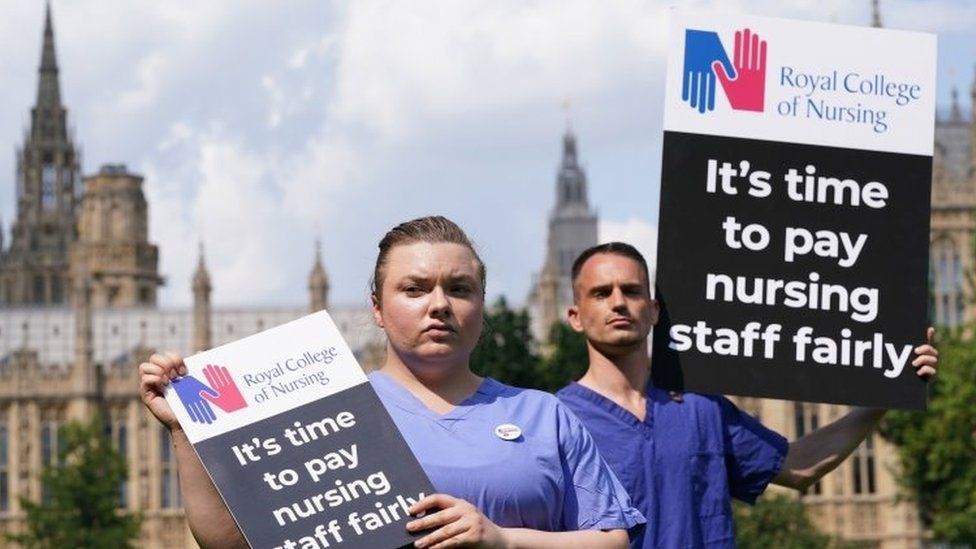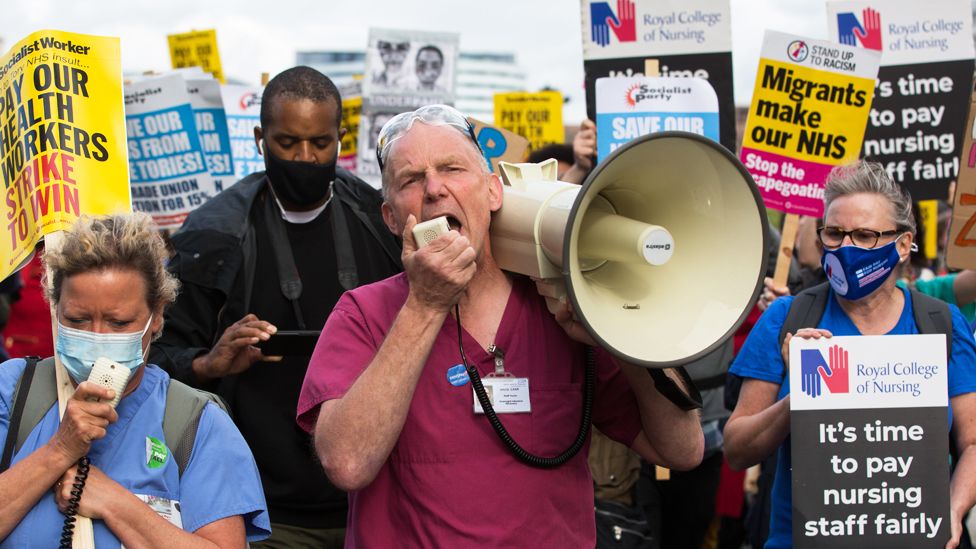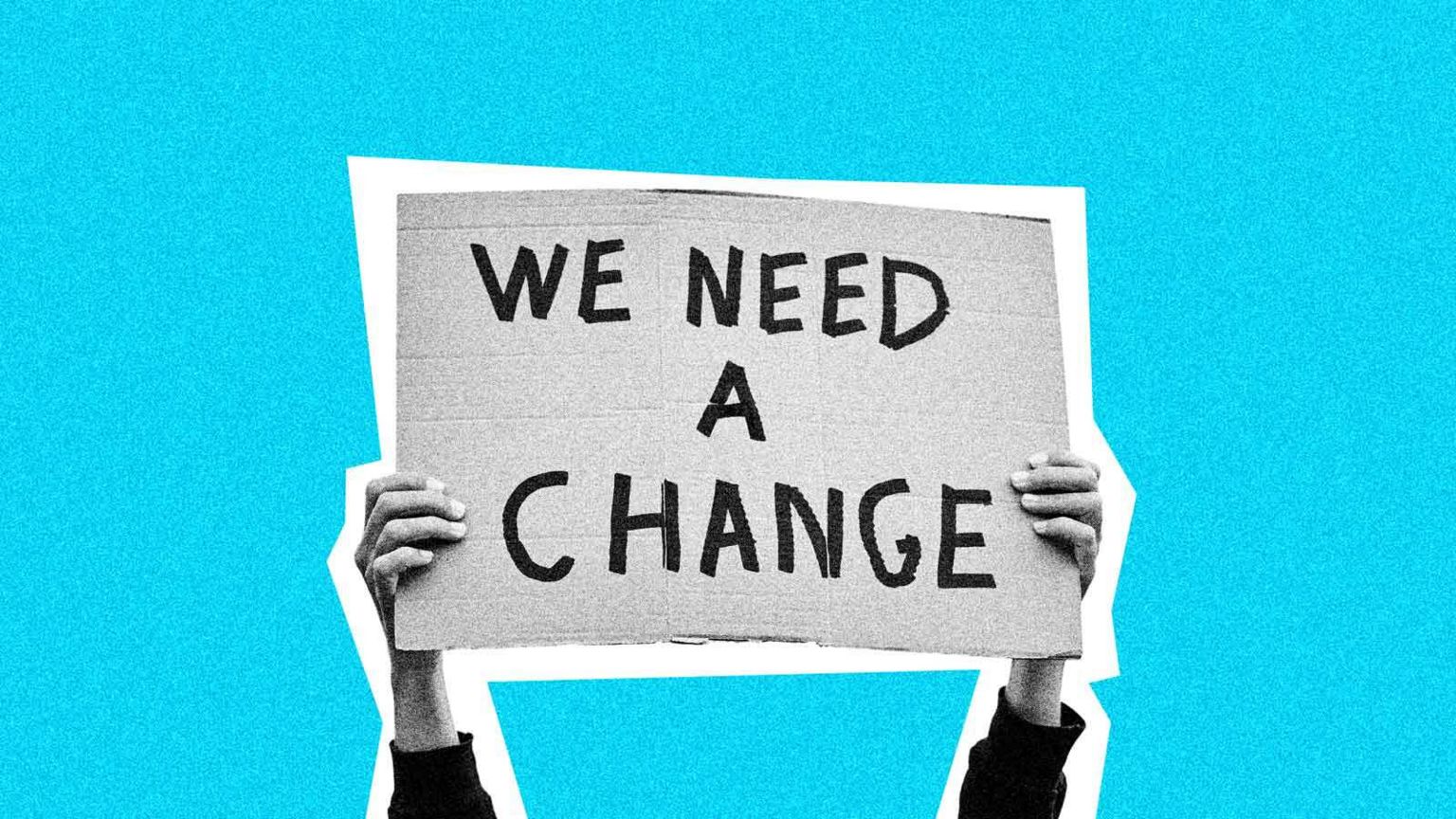PMQs: Nurses strike is a badge of shame, Labour leader says
This video can not be played
To play this video you need to enable JavaScript in your browser.
The largest strike action taken by nurses in the NHS’s history is “a badge of shame”, Labour leader Sir Keir Starmer told Rishi Sunak at Prime Minister’s Questions.
The Labour leader said Mr Sunak was in “hibernation” instead of working to call off Thursday’s strike.
Sir Keir urged the PM to hold talks with nurses to resolve the pay dispute.
But Mr Sunak said nurses had a “fair” pay deal and his government had engaged with all unions.
Nurses in England, Wales and Northern Ireland are set to strike on 15 and 20 December after two days of industrial action was announced by the Royal College of Nursing (RCN) union.
The union is calling for a pay rise of 19.2%, but the government says this is unaffordable, and it had met independent recommendations on pay.
A meeting between the union and Health Secretary Steve Barclay ended in deadlock on Tuesday, with the RCN condemning ministers’ “belligerence” for refusing to discuss pay.
- Strike by NHS nurses is biggest in their history
- Union accuses minister of belligerence after talks fail
- Nurses strike: ‘I can’t afford to join the picket line’
Nurses will still provide emergency care, but routine services will be affected by the strikes.
Downing Street has called on the RCN to “listen” to concerns of nursing leaders about the level of care provided during planned strikes.
A meeting of the government’s emergency Cobra committee took place on Wednesday morning as ministers discussed contingency plans to deal with the fallout from strikes across health, transport and other sectors.
This video can not be played
To play this video you need to enable JavaScript in your browser.
In the final PMQs of the year, Sir Keir said Mr Sunak needed to “open the door and discuss pay” with the nurses’ union to avert the strikes.
“If he did, the whole country would breathe a sigh of relief. Why won’t he?” the Labour leader asked.
Mr Sunak insisted his government had “consistently spoken to all the unions involved in all the pay disputes”, as strikes are planned in various sectors over winter.
The prime minister said he wanted to “put it on record what we’ve done for nurses”, adding that while other public-sector workers got a pay freeze last year, nurses received a 3% rise.
But Sir Keir said nurses going on strike “is a badge of shame for this government”.
“Instead of showing leadership, he is playing games with people’s health and there is a human cost,” he said.
While acknowledging disruption to care, the prime minister said the government was standing by the offers recommended by the independent pay review body.
He claimed the strikes were “Labour’s nightmare before Christmas” because of the party’s links with the unions.
In response, Sir Keir said Mr Sunak was “pretending everything is fine”.
“After 12 years of Tory failure, winter has arrived for our public services, and we’ve got a prime minister who has curled up in a ball and gone into hibernation,” he said.
The SNP’s Westminster leader, Stephen Flynn, followed the Labour leader, calling on the PM to take “the Scottish Government’s lead” on dealing with public-sector strikes.
On Monday, the devolved Scottish government agreed a 7.5% pay deal with two NHS unions – the Unite and Unison unions – which called off their strikes.
In reply, Mr Sunak said the health secretary and other ministers had “engaged fully, not just with the unions but with an independent pay-setting process”.
Liberal Democrat leader Sir Ed Davey focused on the “dreadful cancer backlog” and asked the PM to guarantee it would not get worse.
Sir Ed – who lost both of his parents to cancer as a child – said “40% of cancer patients now wait more than two months for treatment”.
Responding, Mr Sunak said “cancer treatment rates in the most recent months for which we have data are now back at pre-pandemic levels”, with plans in place to fast-track testing for the disease.

How many NHS vacancies are there?
At PMQs, the prime minister and the Labour leader clashed over the nurses’ strike and the NHS.
Labour’s Keir Starmer said: “Ask anyone in the NHS, they’ll tell you they don’t have enough staff – 133,000 vacancies.”
According to the latest data, there were 133,446 full-time equivalent vacancies in NHS England in September – a vacancy rate of 9.7%.
Nursing vacancies accounted for 47,496 of that overall number – with a vacancy rate of 11.9% in this sector.
In December 2019, before the pandemic, the total NHS vacancy rate was 8.1%.
Your device may not support this visualisation
-
What will nurses’ strike mean for patients?
-
54 minutes ago

-
-
Nurses across UK back strikes in pay dispute
-
9 November

-
-
People are striking – here’s what you need to know
-
5 December

-
Published at Wed, 14 Dec 2022 14:16:40 +0000
